-
 Bitcoin
Bitcoin $87,160.3686
2.59% -
 Ethereum
Ethereum $1,577.5291
-0.58% -
 Tether USDt
Tether USDt $1.0000
0.00% -
 XRP
XRP $2.0804
0.22% -
 BNB
BNB $596.3334
0.99% -
 Solana
Solana $136.5658
-0.15% -
 USDC
USDC $1.0000
0.00% -
 Dogecoin
Dogecoin $0.1584
1.77% -
 TRON
TRON $0.2458
-0.32% -
 Cardano
Cardano $0.6208
0.05% -
 Chainlink
Chainlink $13.1006
-1.96% -
 UNUS SED LEO
UNUS SED LEO $9.1412
-1.97% -
 Avalanche
Avalanche $19.9880
2.50% -
 Stellar
Stellar $0.2528
3.56% -
 Shiba Inu
Shiba Inu $0.0...01238
-0.19% -
 Toncoin
Toncoin $2.8930
-3.79% -
 Sui
Sui $2.2031
4.44% -
 Hedera
Hedera $0.1692
1.25% -
 Bitcoin Cash
Bitcoin Cash $343.2002
2.28% -
 Polkadot
Polkadot $3.8296
-1.99% -
 Hyperliquid
Hyperliquid $17.9378
1.39% -
 Litecoin
Litecoin $78.0777
0.75% -
 Dai
Dai $0.9999
0.00% -
 Bitget Token
Bitget Token $4.4322
0.90% -
 Ethena USDe
Ethena USDe $0.9993
0.00% -
 Pi
Pi $0.6347
-0.88% -
 Monero
Monero $214.7110
-0.08% -
 Uniswap
Uniswap $5.2643
-0.22% -
 Pepe
Pepe $0.0...07787
2.99% -
 Aptos
Aptos $4.9970
-0.84%
Is Ethereum spot trading suitable for beginners?
Before Ethereum spot trading, beginners must understand its technology, assess risk tolerance, choose a reliable exchange, learn basic trading concepts, practice with a demo account, and commit to continuous learning.
Mar 01, 2025 at 06:12 am

Is Ethereum Spot Trading Suitable for Beginners?
Key Points:
- Understanding Ethereum: Before even considering spot trading, a comprehensive understanding of Ethereum's technology, its use cases, and its volatility is crucial. This includes grasping the concept of smart contracts, decentralized applications (dApps), and the role of Ethereum in the broader cryptocurrency ecosystem.
- Risk Assessment and Capital Management: Spot trading inherently involves risk. Beginners need to thoroughly assess their risk tolerance and only invest capital they can afford to lose. A detailed understanding of market fluctuations, potential losses, and the importance of diversification is paramount.
- Choosing a Reliable Exchange: The platform used for trading significantly impacts the user experience and security. Beginners must research and select a reputable exchange with robust security measures, user-friendly interface, and good customer support. Factors like fees, trading volume, and available order types should also be considered.
- Learning Basic Trading Concepts: Familiarity with fundamental trading concepts like order types (market orders, limit orders, stop-loss orders), technical analysis (chart patterns, indicators), and fundamental analysis (assessing the underlying value of Ethereum) is vital for informed decision-making. A gradual approach to learning, starting with simpler concepts, is recommended.
- Practicing with a Demo Account: Most exchanges offer demo accounts that allow users to simulate trading with virtual funds. This provides a risk-free environment to practice trading strategies, learn the platform's interface, and build confidence before committing real capital.
- Staying Informed and Continuous Learning: The cryptocurrency market is highly dynamic. Beginners need to stay updated on market trends, news, and regulatory developments affecting Ethereum. Continuous learning through reputable sources is essential for making informed trading decisions.
Detailed Explanation of Each Key Point:
- Understanding Ethereum: Ethereum is far more than just a cryptocurrency; it's a decentralized platform that enables the creation and execution of smart contracts and decentralized applications (dApps). Unlike Bitcoin, which primarily functions as a store of value, Ethereum's versatility makes it a powerful tool with diverse applications ranging from decentralized finance (DeFi) to non-fungible tokens (NFTs). Before venturing into spot trading, beginners need to grasp the core concepts underpinning Ethereum's functionality. This involves understanding the Ethereum Virtual Machine (EVM), gas fees (transaction costs), and the different types of Ethereum wallets. It's crucial to understand that Ethereum's price is subject to significant volatility, influenced by factors such as technological developments, regulatory changes, market sentiment, and adoption rates. A thorough understanding of these factors will help beginners make more informed trading decisions, minimizing potential risks. Ignoring this crucial step can lead to uninformed investments and potential significant financial losses.
- Risk Assessment and Capital Management: Spot trading involves buying and selling Ethereum at the current market price. While potentially lucrative, it also carries substantial risks. The price of Ethereum can fluctuate dramatically in short periods, leading to significant gains or losses. Before engaging in spot trading, beginners must honestly assess their risk tolerance. How much money are they willing to lose without jeopardizing their financial stability? It's crucial to only invest capital they can afford to lose entirely. Furthermore, proper capital management involves diversifying investments, avoiding emotional trading decisions (fear and greed), and setting realistic profit targets and stop-loss orders to limit potential losses. A well-defined trading plan that includes risk management strategies is essential for mitigating risks and promoting long-term success in the volatile cryptocurrency market.
- Choosing a Reliable Exchange: The platform used for spot trading plays a vital role in the overall experience and security. Beginners should prioritize selecting a reputable exchange with a proven track record of security and reliability. This involves researching the exchange's history, its security measures (e.g., two-factor authentication, cold storage), and its reputation within the cryptocurrency community. A user-friendly interface is crucial for beginners, making it easier to navigate the platform and execute trades effectively. Factors like trading fees, trading volume (higher volume generally indicates better liquidity), and the availability of different order types (market orders, limit orders, stop-loss orders) should also be considered. It's crucial to compare multiple exchanges before settling on one to ensure you're getting the best possible trading experience and fees.
- Learning Basic Trading Concepts: Successful spot trading requires a basic understanding of key trading concepts. This includes different order types: market orders (buying or selling at the current market price), limit orders (buying or selling at a specified price), and stop-loss orders (automatically selling if the price drops below a certain level). Technical analysis involves studying price charts and using indicators to identify potential trading opportunities. Fundamental analysis focuses on assessing the underlying value of Ethereum based on factors such as its technological advancements, adoption rate, and market sentiment. Beginners should start with the basics, gradually expanding their knowledge as they gain experience. Resources like online courses, educational articles, and trading communities can provide valuable insights and support. Rushing into complex strategies without a solid foundation can lead to costly mistakes.
- Practicing with a Demo Account: Many cryptocurrency exchanges offer demo accounts, allowing users to simulate trading with virtual funds. This is an invaluable tool for beginners, providing a risk-free environment to practice trading strategies, learn the platform's interface, and gain confidence before using real money. Demo accounts allow users to experiment with different order types, technical indicators, and trading strategies without risking any capital. This practice helps to familiarize users with the trading process, identify potential weaknesses in their strategies, and develop a more informed approach to real-world trading. Using a demo account before investing real funds is highly recommended for minimizing the risk of significant losses.
- Staying Informed and Continuous Learning: The cryptocurrency market is highly dynamic, influenced by technological advancements, regulatory changes, market sentiment, and global events. Beginners need to stay informed about these factors to make informed trading decisions. Following reputable news sources, engaging with the cryptocurrency community, and continuously learning about new developments are crucial for long-term success. Staying updated on market trends, understanding the implications of regulatory changes, and keeping abreast of technological advancements will allow beginners to adapt their strategies and make better trading decisions. Continuous learning is essential for navigating the complexities of the cryptocurrency market and staying ahead of the curve.
FAQs:
Q: Is spot trading Ethereum more risky than holding Ethereum long-term?
A: Yes, spot trading Ethereum is generally considered riskier than holding it long-term (HODLing). Spot trading exposes you to the volatility of the market, meaning you can experience significant losses if the price drops. HODLing, on the other hand, mitigates this risk by holding onto your Ethereum regardless of short-term price fluctuations.
Q: What are the potential benefits of spot trading Ethereum?
A: The potential benefits include the possibility of higher returns compared to HODLing if you time the market correctly. Spot trading allows for greater flexibility and the ability to react to market changes more quickly.
Q: How much money should a beginner start with for Ethereum spot trading?
A: A beginner should start with only the amount of money they can afford to lose entirely. It’s crucial to prioritize risk management and avoid investing money needed for essential expenses. Start small and gradually increase your investment as you gain experience and confidence.
Q: What are the best resources for learning about Ethereum spot trading?
A: Numerous resources are available, including online courses (Coursera, Udemy), educational websites focused on cryptocurrency, and reputable YouTube channels. Join active and helpful online communities for discussions and learning from others' experiences. Always critically evaluate information and be wary of scams or misleading advice.
Q: Are there any fees associated with Ethereum spot trading?
A: Yes, most exchanges charge trading fees, which can vary depending on the platform and trading volume. Some exchanges also charge deposit and withdrawal fees. It’s important to understand and factor these fees into your trading strategy.
Q: How can I protect myself from scams when spot trading Ethereum?
A: Only use reputable and well-established cryptocurrency exchanges. Be wary of promises of guaranteed high returns, and never share your private keys or seed phrases with anyone. Thoroughly research any investment opportunity before committing funds. Always prioritize security and due diligence.
Q: What are some common mistakes beginners make when spot trading Ethereum?
A: Common mistakes include emotional trading (driven by fear or greed), insufficient research, ignoring risk management, and neglecting continuous learning. Beginners often overestimate their knowledge and underestimate market volatility. Starting small and learning gradually is crucial to avoiding costly errors.
Q: What is the difference between spot trading and futures trading of Ethereum?
A: Spot trading involves buying and selling Ethereum at the current market price. Futures trading involves agreeing to buy or sell Ethereum at a specific price on a future date. Futures trading involves significantly higher risk and is generally not recommended for beginners. Understanding this distinction is crucial before engaging in either type of trading.
Disclaimer:info@kdj.com
The information provided is not trading advice. kdj.com does not assume any responsibility for any investments made based on the information provided in this article. Cryptocurrencies are highly volatile and it is highly recommended that you invest with caution after thorough research!
If you believe that the content used on this website infringes your copyright, please contact us immediately (info@kdj.com) and we will delete it promptly.
- Lightchain AI: The Future of Cryptocurrency
- 2025-04-22 05:30:13
- Coinbase Expands XRP Futures Contracts Trading
- 2025-04-22 05:30:13
- Difficulty Spike and Hashrate Drop Lengthen Block Times
- 2025-04-22 05:25:13
- Despite the Harshest Profit Squeeze in Half a Decade, Bitcoin Mining on U.S. Soil is Consolidating and Gathering Momentum
- 2025-04-22 05:25:13
- Bitcoin (BTC) markets ticked higher
- 2025-04-22 05:20:13
- Shiba Inu (SHIB) and Lightchain AI (LCAI) Are Rapidly Gaining Ground, Positioning Themselves as Serious Competitors to Dogecoin.
- 2025-04-22 05:20:13
Related knowledge
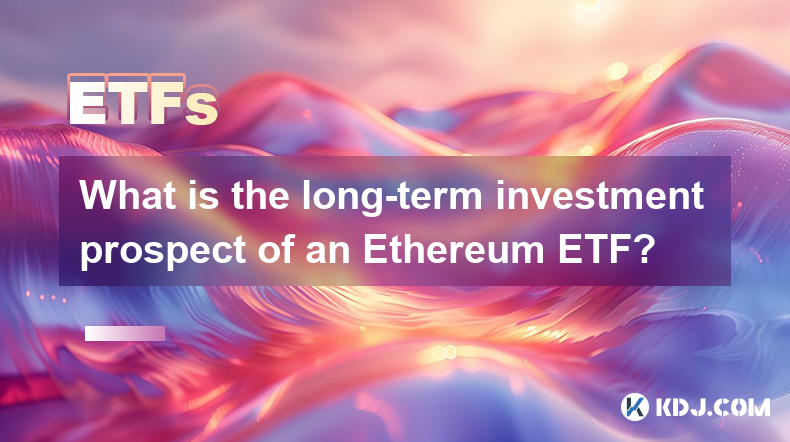
What is the long-term investment prospect of an Ethereum ETF?
Mar 18,2025 at 03:01pm
Key Points:Uncertainty surrounds the long-term prospects of an Ethereum ETF due to regulatory hurdles and market volatility.Approval hinges on regulatory clarity regarding cryptocurrencies, especially concerning investor protection and market manipulation.Successful ETF launches could boost Ethereum's price and adoption, but failure could negatively imp...
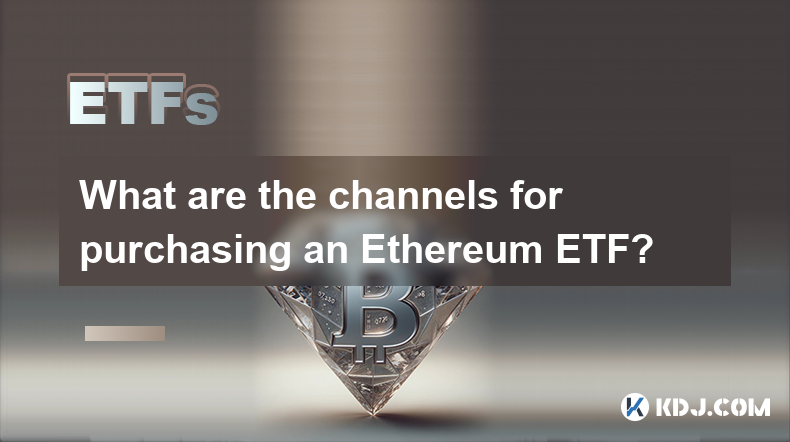
What are the channels for purchasing an Ethereum ETF?
Mar 18,2025 at 01:49am
Key Points:Currently, there are no Ethereum ETFs available for direct purchase by the general public in most major markets.Access to Ethereum exposure through ETFs is limited, mainly through futures-based ETFs.Purchasing Ethereum directly or through other investment vehicles remains a viable alternative.Regulatory hurdles and market complexities signifi...
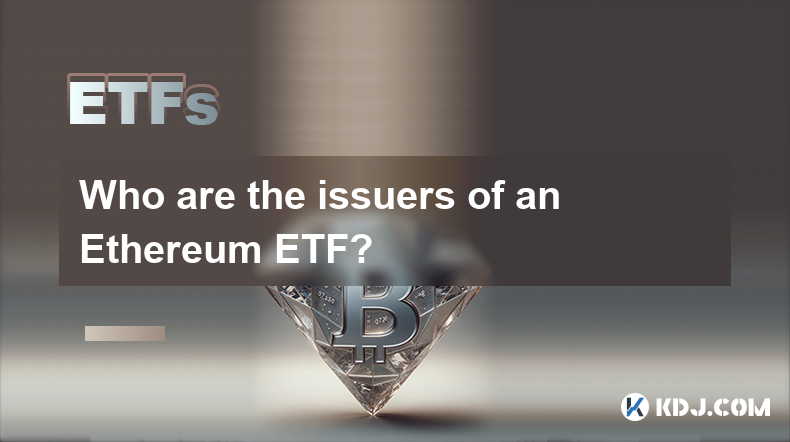
Who are the issuers of an Ethereum ETF?
Mar 19,2025 at 08:07pm
Key Points:There are no currently approved Ethereum ETFs in the US, meaning no single issuer can be definitively named. However, several firms have filed applications.The issuers of potential Ethereum ETFs will be large, established financial institutions, typically asset management companies.The specific requirements for ETF issuers are stringent and o...
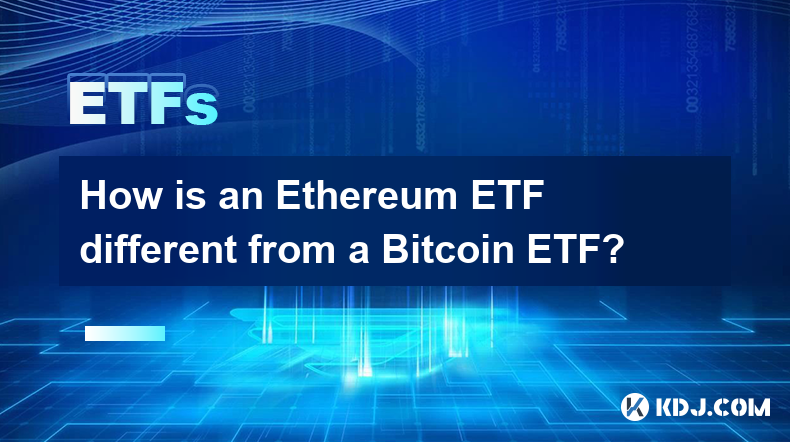
How is an Ethereum ETF different from a Bitcoin ETF?
Mar 17,2025 at 10:55am
Key Points:Underlying Asset: The core difference lies in the underlying asset: an Ethereum ETF tracks the price of Ether (ETH), while a Bitcoin ETF tracks the price of Bitcoin (BTC).Technology and Use Cases: Ethereum's blockchain supports smart contracts and decentralized applications (dApps), creating a distinct technological and investment narrative c...
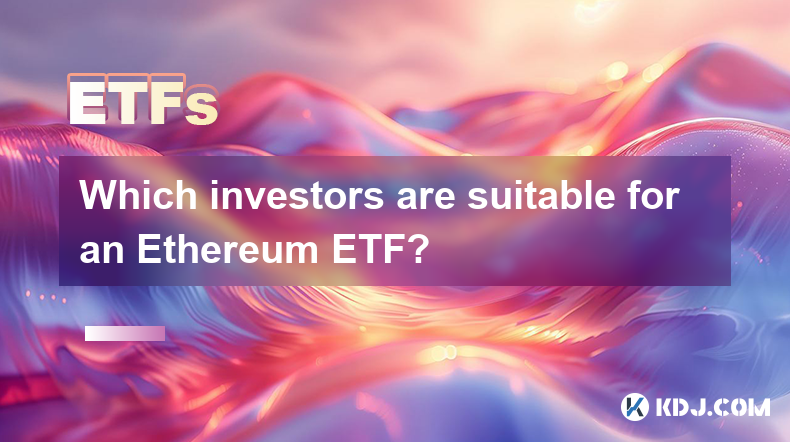
Which investors are suitable for an Ethereum ETF?
Mar 16,2025 at 05:50pm
Key Points:Risk Tolerance: Ethereum ETF investment requires a high risk tolerance due to the volatility of the cryptocurrency market.Investment Goals: Investors seeking long-term growth potential and exposure to the Ethereum ecosystem are suitable candidates.Investment Horizon: A longer-term investment horizon is crucial to weather market fluctuations.U...
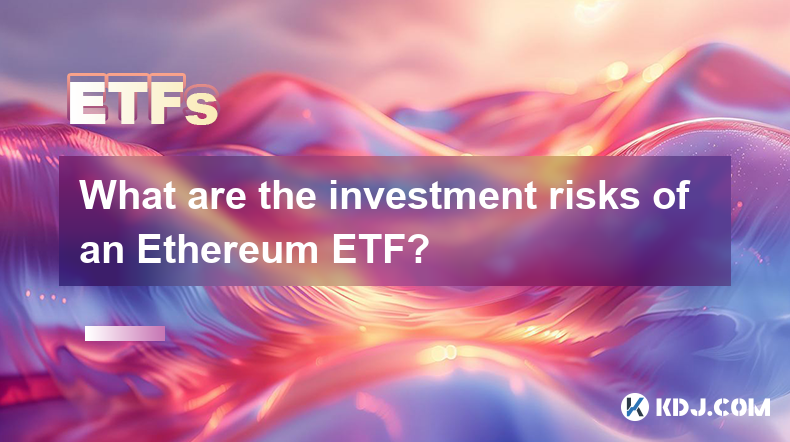
What are the investment risks of an Ethereum ETF?
Mar 18,2025 at 02:12am
Key Points:Price Volatility: Ethereum's price is highly volatile, impacting ETF share prices.Regulatory Uncertainty: Changes in regulatory landscapes can significantly affect ETF trading and performance.Market Manipulation: The potential for market manipulation, particularly in smaller ETFs, exists.Underlying Asset Risk: Risks associated with the Ethere...

What is the long-term investment prospect of an Ethereum ETF?
Mar 18,2025 at 03:01pm
Key Points:Uncertainty surrounds the long-term prospects of an Ethereum ETF due to regulatory hurdles and market volatility.Approval hinges on regulatory clarity regarding cryptocurrencies, especially concerning investor protection and market manipulation.Successful ETF launches could boost Ethereum's price and adoption, but failure could negatively imp...

What are the channels for purchasing an Ethereum ETF?
Mar 18,2025 at 01:49am
Key Points:Currently, there are no Ethereum ETFs available for direct purchase by the general public in most major markets.Access to Ethereum exposure through ETFs is limited, mainly through futures-based ETFs.Purchasing Ethereum directly or through other investment vehicles remains a viable alternative.Regulatory hurdles and market complexities signifi...

Who are the issuers of an Ethereum ETF?
Mar 19,2025 at 08:07pm
Key Points:There are no currently approved Ethereum ETFs in the US, meaning no single issuer can be definitively named. However, several firms have filed applications.The issuers of potential Ethereum ETFs will be large, established financial institutions, typically asset management companies.The specific requirements for ETF issuers are stringent and o...

How is an Ethereum ETF different from a Bitcoin ETF?
Mar 17,2025 at 10:55am
Key Points:Underlying Asset: The core difference lies in the underlying asset: an Ethereum ETF tracks the price of Ether (ETH), while a Bitcoin ETF tracks the price of Bitcoin (BTC).Technology and Use Cases: Ethereum's blockchain supports smart contracts and decentralized applications (dApps), creating a distinct technological and investment narrative c...

Which investors are suitable for an Ethereum ETF?
Mar 16,2025 at 05:50pm
Key Points:Risk Tolerance: Ethereum ETF investment requires a high risk tolerance due to the volatility of the cryptocurrency market.Investment Goals: Investors seeking long-term growth potential and exposure to the Ethereum ecosystem are suitable candidates.Investment Horizon: A longer-term investment horizon is crucial to weather market fluctuations.U...

What are the investment risks of an Ethereum ETF?
Mar 18,2025 at 02:12am
Key Points:Price Volatility: Ethereum's price is highly volatile, impacting ETF share prices.Regulatory Uncertainty: Changes in regulatory landscapes can significantly affect ETF trading and performance.Market Manipulation: The potential for market manipulation, particularly in smaller ETFs, exists.Underlying Asset Risk: Risks associated with the Ethere...
See all articles






















































































